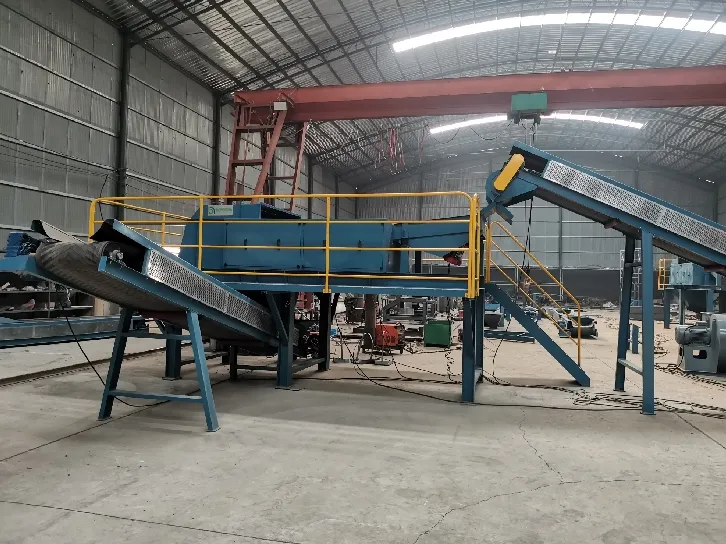

nov . 26, 2024 18:47 Back to list
The Role of MSW Sorting Plants in Sustainable Waste Management
As urban populations continue to grow, the challenge of managing municipal solid waste (MSW) has become increasingly critical. Among the various strategies for sustainable waste management, MSW sorting plants have emerged as a vital component for recycling and resource recovery. These facilities play an essential role in separating recyclable materials from general waste, thus helping to conserve natural resources, reduce landfill usage, and promote environmental sustainability.
Municipal solid waste encompasses a wide range of materials, including organic waste, plastics, metals, paper, and glass. The indiscriminate disposal of these materials poses significant risks to the environment, from land and water pollution to increased greenhouse gas emissions. Therefore, the implementation of MSW sorting plants is imperative in increasing recycling rates and minimizing waste generation.
The Functionality of MSW Sorting Plants
MSW sorting plants are designed to classify and separate various types of waste through a series of mechanical and manual processes. Typically, the process begins with the collection of waste, which is then transported to the sorting facility. Upon arrival, the waste undergoes initial screening to remove non-recyclable items such as hazardous materials and large debris.
Following this initial phase, the waste is processed through various techniques. Conveyer belts, shredders, air classifiers, and magnetic separators are commonly utilized to separate materials based on their physical properties. For instance, magnetic systems efficiently extract metals from the waste stream, while air classifiers can differentiate between light and heavy materials. Additionally, optical sorting technologies have advanced significantly, allowing for the precise identification and sorting of different plastics and other recyclable items.
Once the materials have been sorted, they are compressed into bales for storage and transportation to recycling facilities. This streamlining of recyclable materials not only increases efficiency but also fosters a more organized approach to material recovery.

Environmental Benefits of MSW Sorting Plants
The environmental benefits of MSW sorting plants are substantial. By facilitating the recycling process, these facilities contribute to a reduction in the volume of waste sent to landfills. This reduction is crucial, as landfilling can lead to soil and groundwater contamination, as well as methane emissions—a potent greenhouse gas. Furthermore, recycling conserves energy and reduces the need for raw material extraction, thereby lowering the overall environmental footprint associated with the production of new products.
In addition to combating pollution and lowering emissions, MSW sorting plants also have a significant economic impact. By creating a steady stream of recyclable materials, these facilities support local and national recycling industries. The jobs created in these sectors not only contribute to economic growth but also promote community engagement in sustainability efforts.
Challenges and Future Directions
Despite the clear benefits of MSW sorting plants, several challenges remain. One significant obstacle is public participation in waste sorting and recycling initiatives. Although education on proper waste disposal practices is improving, there is still work to be done to increase community awareness and involvement.
Moreover, technological advancements must also keep pace with the growing complexity of waste streams. As new materials and products enter the market, sorting plants will need ongoing investment in innovative technologies to ensure efficient processing. Government policies and incentives can play a crucial role in supporting such advancements and encouraging the establishment of more MSW sorting facilities.
In conclusion, MSW sorting plants are instrumental in the pursuit of sustainable waste management. By effectively separating recyclable materials from general waste, these facilities promote recycling, reduce landfill reliance, and mitigate environmental impacts. Addressing the challenges faced in this sector requires collaboration between government, industry, and communities. As we move toward a more sustainable future, enhancing the capabilities and efficiencies of MSW sorting plants will be vital in achieving our waste management goals. This commitment will not only benefit the environment but also foster a more sustainable economy for generations to come.
Latest news
Troubleshooting Common Eddy Separator Problems
NewsJul.04,2025
The Role of Metal Recycling Plants in Circular Economy
NewsJul.04,2025
The Impact of Recycling Line Pickers on Waste Management Costs
NewsJul.04,2025
Safety Features Every Metal Shredder Should Have
NewsJul.04,2025
How Industrial Shredders Improve Waste Management Systems
NewsJul.04,2025
How Cable Granulators Contribute to Sustainable Recycling
NewsJul.04,2025